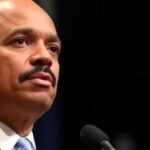In a disappointing turn at the COP30 climate summit in Brazil, world leaders finalized a nonbinding agreement that sidesteps firm commitments to phase out fossil fuels, leaving investors and economists grappling with heightened uncertainty in the global economy. Held in Belém from November 10-21, 2025, the event drew over 50,000 delegates but failed to deliver the bold action needed to combat escalating climate threats, according to environmental advocates.
Delegates Deadlock on Fossil Fuel Phase-Out Demands
The core tension at COP30 revolved around the contentious issue of fossil fuels, which continue to power a significant portion of the world’s energy needs. Despite mounting scientific evidence from the Intergovernmental Panel on Climate Change (IPCC) warning that emissions must peak before 2025 to limit warming to 1.5 degrees Celsius, negotiators from oil-dependent nations like Saudi Arabia and Russia resisted explicit language calling for a phase-out. “We cannot sacrifice our economic stability for unproven transitions,” stated Saudi Energy Minister Prince Abdulaziz bin Salman during a heated plenary session.
Brazil, as the host nation under President Luiz Inácio Lula da Silva, pushed for stronger language, emphasizing the Amazon’s vulnerability to deforestation linked to fossil fuel-driven industries. However, the final text only “urges” countries to reduce reliance on coal, oil, and gas without timelines or targets. This vagueness echoes the COP28 outcome in Dubai, where a fossil fuel transition was mentioned but not mandated, leading to criticism that the climate summit is becoming a forum for delays rather than decisions.
Environmental groups like Greenpeace lambasted the deal. “COP30 was a missed opportunity to break the fossil fuel addiction that’s choking our planet,” said Jennifer Morgan, executive director of Greenpeace International. Data from the International Energy Agency (IEA) underscores the stakes: fossil fuels accounted for 80% of global energy consumption in 2024, contributing to record CO2 levels of 419 parts per million last year.
Clean Energy Investments Face Immediate Backlash
The tepid COP30 agreement has sent ripples through the clean energy sector, where billions in investments hang in the balance. Venture capital firms and green funds, anticipating robust policy signals, now face a chill in funding for solar, wind, and battery technologies. According to a BloombergNEF report released post-summit, global clean energy investments could drop by 15-20% in 2026 if regulatory uncertainty persists, potentially stalling projects worth $1.7 trillion annually.
In the U.S., the Inflation Reduction Act of 2022 had spurred $110 billion in clean energy commitments, but experts warn that without international alignment from COP30, domestic momentum may wane. “Investors need certainty, not ambiguity,” noted Amy Myers Jaffe, director of the Energy, Climate Justice, and Sustainability Lab at New York University. European nations, already grappling with energy crises post-Ukraine war, saw stock prices of renewable giants like Ørsted plummet 5% on the first trading day after the summit’s close.
Developing countries, represented by the G77 bloc, highlighted how the lack of fossil fuel commitments exacerbates inequities. India and South Africa argued that wealthier nations should foot the bill for their shift to clean energy, citing the $100 billion annual climate finance pledge that’s chronically underdelivered—only $83.3 billion was mobilized in 2022, per OECD figures.
World Leaders Voice Frustration Amid Economic Jitters
Reactions from global leaders painted a picture of divided resolve at COP30. UN Secretary-General António Guterres called the outcome “insufficient” in a stark address, urging, “We are hurtling toward a climate catastrophe, and half-measures won’t save us.” U.S. Climate Envoy John Kerry, attending his final COP before retirement, expressed cautious optimism but admitted the deal falls short of Paris Agreement goals.
China, the world’s largest emitter, praised the agreement’s focus on “common but differentiated responsibilities,” while committing to peak emissions before 2030. Yet, behind closed doors, diplomats revealed tensions: the European Union pushed for a 45% emissions cut by 2030, only to settle for aspirational targets. Brazilian officials defended the host’s role, pointing to domestic wins like a $20 billion rainforest preservation fund announced during the summit.
Economically, the summit exposed fault lines in international cooperation. The World Bank estimates that unchecked climate change could shave 2.6% off global GDP by 2030, with fossil fuel subsidies—totaling $7 trillion in 2022 according to the IMF—distorting markets and hindering clean energy adoption. “This deal risks a fragmented global economy where green leaders pull ahead while others lag,” warned IMF Managing Director Kristalina Georgieva in a post-COP30 statement.
Emerging Markets Brace for Fossil Fuel Dependency Trap
For emerging markets, the COP30 fallout amplifies fears of being locked into fossil fuels amid a transitioning global economy. Nations like Indonesia and Nigeria, rich in oil and coal reserves, worry that without phase-out support, their development paths will clash with climate imperatives. Indonesia’s environment minister, Hanif Faisol Nurofiq, warned that abrupt fossil fuel curbs could cost his country 1.5 million jobs in the energy sector alone.
The agreement’s nod to “just transitions” includes vague promises of technology transfers and finance for clean energy in the Global South, but specifics are absent. A UN Environment Programme analysis projects that Africa, contributing less than 4% of historical emissions, could lose $50 billion yearly to climate impacts by 2040 if investments don’t surge. Activists from small island states, such as the Maldives, staged protests at COP30, decrying the deal as a “death sentence” for vulnerable ecosystems.
Positive glimmers include side deals: the U.S. and EU pledged $5 billion for clean energy grids in Latin America, and a coalition of 50 countries launched the Tropical Forest Alliance to combat deforestation linked to fossil fuel expansion. Still, economists like those at the Peterson Institute for International Economics predict that COP30’s ambiguity could inflate energy prices by 10-15% globally over the next decade, squeezing household budgets and trade balances.
Charting the Road to COP31 and Beyond
As the dust settles on COP30, attention shifts to fortifying clean energy pathways and stabilizing the global economy against climate volatility. The next summit, COP31 in Australia, is eyed as a potential reset, with calls for binding fossil fuel reduction targets gaining traction among youth activists and progressive policymakers. The European Commission’s Green Deal aims to invest €1 trillion by 2030 in renewables, potentially setting a benchmark if replicated globally.
Private sector involvement could bridge gaps left by governments. Tech moguls like Elon Musk touted Tesla’s expansion into battery storage at COP30 forums, while BlackRock’s Larry Fink emphasized ESG investing’s role in redirecting $130 trillion in assets toward sustainable projects. Policymakers must now operationalize the tepid deal: national adaptation plans due in 2026 will test commitments, and the IEA forecasts that tripling renewable capacity by 2030 remains feasible but requires $4 trillion in annual funding.
Ultimately, COP30’s legacy may lie in galvanizing urgency. With extreme weather events—like the 2025 Brazilian floods displacing 200,000—intensifying, the global economy faces a crossroads. Strengthening multilateral ties, accelerating clean energy innovation, and equitably addressing fossil fuel transitions will be pivotal to averting deeper economic disruptions and fostering resilient growth.








